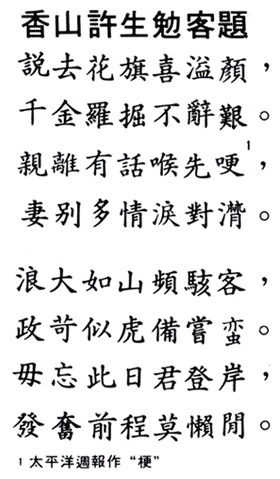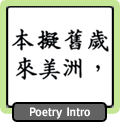
|
|
Poem by One Named Xu From Xiangshan
Encouraging the Traveler
Just talk about going to the land of the Flowery Flag 1 and my countenance fills with happiness.
Not without hard work were 1,000 pieces of gold dug up and gathered together.
There were words of farewell to the parents, but the throat choked up first.
There were many feelings, many tears flowing face to face, when parting with the wife.
Waves big as mountains often astonished this traveler.
With laws harsh as tigers,2 I had a taste of all the barbarities.
Do not forget this day when you land ashore.
Push yourself ahead and do not be lazy or idle.
Reprinted with permission from University of Washington Press.
1 A Cantonese colloquialism for the United States.
2 From "Tangong," a chapter in the 'Book of Rites'. Confucius was passing Mt. Taj and saw a woman weeping and wailing at a grave. Confucius asked one of his disciples to as why she was wailing so sadly . She said, "My father-in-law and my husband were killed by tigers. Now my son is also killed by a tiger." Confucius asked why she didn't leave this dangerous place. She replied that it was because there is no oppressive rule here. Confucius remarked, "Oppressive rule is surely fiercer than any tiger."
|






